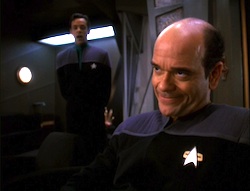“Doctor Bashir, I Presume?”
Written by Jimmy Diggs and Ronald D. Moore
Directed by David Livingston
Season 5, Episode 16
Production episode 40510-514
Original air date: February 24, 1997
Stardate: unknown
Station log: Rom has spent the last several weeks trying to work up the courage to ask Leeta out. He has failed. Leeta is starting to think he isn’t interested, and Quark encourages that notion, as he knows that Rom will never actually ask her out. Quark insists that his brother wants someone with brains and a body, and when Leeta insists that she has brains, Quark snidely says that’s why he hired her, and then tells her to get back to work so everyone can see her brains.
Bashir and O’Brien’s darts game is interrupted by Dr. Lewis Zimmerman of the holographic imaging and research center on Jupiter Station. He’s the one who developed the Emergency Medical Hologram—and patterned it after himself—and now is developing a Long-Term Medical Hologram. The LMH’s purpose is to be used in research outposts, subspace relays, and other places where life-support and/or space is at a premium and the chief medical officer wouldn’t generally need to leave sickbay.
While Zimmerman was the template for the EMH, Bashir has been chosen to be the template for the LMH. Zimmerman will be on the station for three weeks developing the program, starting with an in-depth questionnaire for Bashir to answer so that the LMH can use his personality to interact. (O’Brien comments that now Bashir can irritate hundreds of people he’s never even met.)
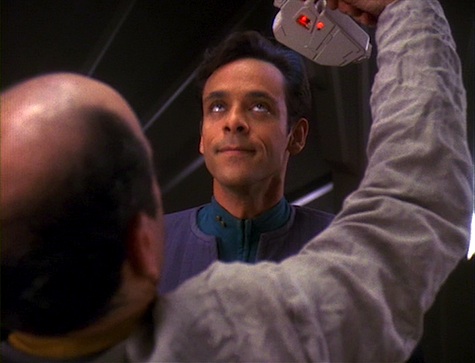
Zimmerman also plans to conduct in-depth interviews with Bashir’s friends and family. When he finds out that Leeta is Bashir’s ex, he adds her to the list, though he’s more interested in her than her opinions of Bashir. Bashir also specifically requests that Zimmerman not interview his parents, as they’re not close and haven’t been for years. Zimmerman says that he understands, and then makes a note to contact Bashir’s parents immediately.
A test run of the LMH’s physical form works fine, though Bashir feels that the eyes don’t have the zest for life that greets him in the mirror every day. Zimmerman then activates the EMH in order to transfer its basic software package into the Bashir-shaped LMH, thus giving us two Robert Picardos and two Alexander Siddigs in the same room. Hilarity ensues.
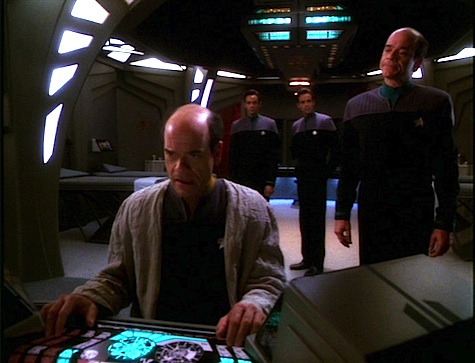
Zimmerman interviews the denizens of DS9 about Bashir. (Most amusing is O’Brien repeatedly asking Zimmerman for assurances that this will never get back to Bashir, and then proceeding to go on at great length about what a great guy Bashir is. “You’re sure Julian won’t read this?”) After his interview with Leeta, Zimmerman asks her out to dinner, thus proving he has more cojones than Rom. Rom sees them having dinner and runs upstairs to interrupt them saying he has something important to say to her in private—and then again fails to ask her out, instead setting a time to fix her replicator.
Richard and Amsha Bashir arrive at the station, to Bashir’s dismay. He grumpily introduces his parents to Sisko and Dax and then gets them out of the office as quick as possible. He’s not pleased that Zimmerman invited them here—telling them it was urgent, no less—and the slow burn he does in their presence is palpable.
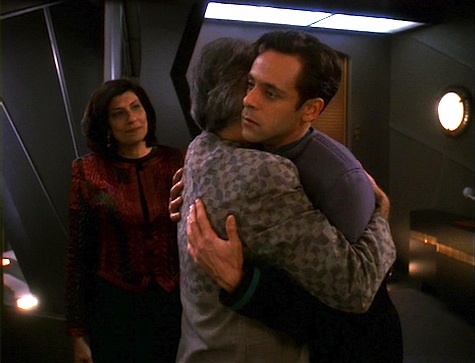
Zimmerman brings flowers to Leeta, as well as a job offer. The bar manager at Jupiter Station is quitting and Zimmerman and the station commander both think Leeta would make an excellent replacement. She’s dubious; she doesn’t even know how to tend bar, which Zimmerman says puts her one up on their last bartender. She’s overwhelmed by the offer from someone she just met, and says she needs time to think.
Dinner with the Bashir family is awkward. Richard offhandedly mentions the time he ran a shuttle service, and Bashir exasperatedly points out that it’s just them now, he can admit that he was a third-class steward (though Richard continues to insist that he resigned, not that he was fired). Apparently his current job of landscape architect is a new one, the latest in a series of new career paths that Richard has attempted. When they discuss the interviews it becomes clear that there’s a dirty little secret in their past that they can’t let Zimmerman find out about or they’re all in trouble—it could ruin Bashir’s career and send his parents to prison.
Leeta talks to Rom about Zimmerman’s job offer, and says that if she has a reason to stay, she’ll stay. Rom can only thumpher about, leading Leeta to realize that she has no reason to stay.
The next day, Richard and Amsha come to talk to Bashir and promise him that they won’t say a word in their interviews with Zimmerman about how Bashir was genetically enhanced as a child, a spectacularly illegal procedure. Unfortunately, they’re not talking to Bashir, they’re talking to the LMH, and Zimmerman and O’Brien are in the next room and heard every word.
O’Brien immediately goes to Bashir to explain what happened. Zimmerman, meanwhile, is filing a report with Starfleet saying that Bashir is unsuitable for imaging for the LMH due to his genetically enhanced background, which will trigger an inquiry that will lead to his discharge from Starfleet.
Bashir tells O’Brien the whole story. By age six he was small for his age, physically awkward, intellectually challenged, and behind everyone else. At age seven, his parents took him to Adigeon Prime and his DNA was resequenced. Everything about him was changed except for his name. And now he’s going to be kicked out of Starfleet—unless he resigns first.
Rom mopes over a drink in Quark’s after closing time. Quark reminds him of Nog’s mother, Prinadora, whose father swindled him out of all his latinum. Females, Quark reminds him, are always trouble.
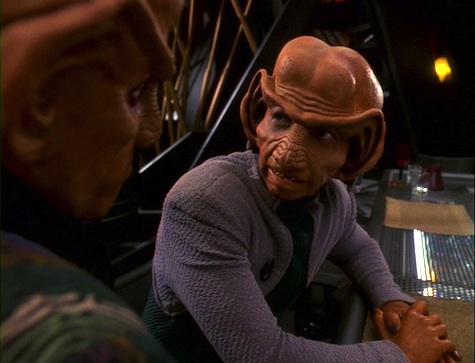
Bashir and his parents have a huge-ass argument. Richard wants to fight this battle all the way to the Federation Supreme Court, but Bashir just wants to resign his commission and be done with it. Bashir resents the crap out of his parents for giving up on him when he was six, but Amsha explains to him that it wasn’t that they were ashamed of him, but that they loved him and it was destroying them to see him fall further behind every day, to stay up late worrying about him and wondering if it was their fault.
Amsha asks what he wants them to do, and he says, “Nothing.” He’ll talk to Sisko in the morning, explain the situation, and resign.
So Richard and Amsha meet with Sisko even earlier in the morning and beat him to the punch. Sisko contacts Admiral Bennett, the Judge Advocate General, and they work out a deal: Bashir will be allowed to keep his commission and his medical practice in exchange for Richard going to prison for two years. Bennett makes a ridiculous speech reminding the audience why there are laws against gentic engineering, to wit, that for every Julian Bashir there’s a Khan Singh waiting in the wings.
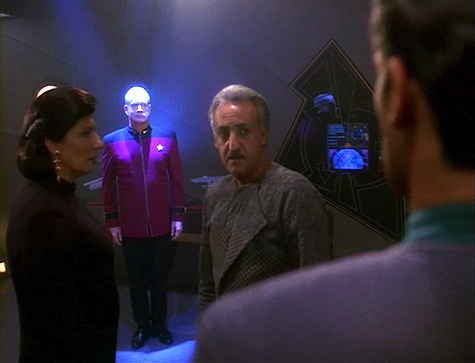
Bashir sees his parents off and thanks his father for his sacrifice. Zimmerman and Leeta are on the same transport to Earth, but before they can board, Rom comes running to the airlock and declares his love for Leeta and asks her to stay. She says she loves him, too, and they smooch. The bar at Jupiter Station will have to find another manager.
Meanwhile, O’Brien realizes that Bashir’s been throwing the darts games—er, so to speak—and the chief forces the doctor to play at his proper level. He throws three darts right into the bull’s eye. So O’Brien declares a new rule: Bashir must stand a couple of meters back. If that doesn’t work, they’ll try a blindfold…
Can’t we just reverse the polarity? At the age of seven, Bashir underwent accelerated critical neural pathway formation to speed up his cognitive abilities, increase his stamina, height, weight, and reflexes, and generally make him better, faster, stronger.
The Sisko is of Bajor: Both Sisko and his son describe Bashir as overeager and of not having the best sense of decorum, with Jake in particular citing his providing of too much information.
Don’t ask my opinion next time: Kira’s blunt description of Bashir is that he doesn’t know when to shut up.
There is no honor in being pummeled: Worf’s even more blunt answer to Zimmerman’s questions is that he doesn’t like doctors. (Crusher and Pulaski must be devastated…)
The slug in your belly: Dax is dying to hear stories of Bashir as a little kid. Given what we learn over the course of the episode, I doubt she got to hear any of them.
Rules of Acquisition: Rom signed a standard five-year marriage contract with Prinadora because he wanted a child. But he fell in love with her, and so when her father presented him with an extension he signed it without reading it, and so Prinadora’s father got all Rom’s latinum, Prinadora married someone else, and Rom was left penniless with Nog.
No sex, please, we’re Starfleet: Zimmerman is attracted to Leeta—even more so when he finds out that she broke up with Bashir—and Rom is attracted to Leeta. The latter feeling is mutual, but Leeta is waiting for Rom to actually say so, and she’s willing to go off with Zimmerman to Jupiter because he won’t speak up. When he finally does declare his love, she declares it back, leaving Zimmerman alone and disheartened—for all of five seconds until he sees an attractive woman on the transport and starts hitting on her.
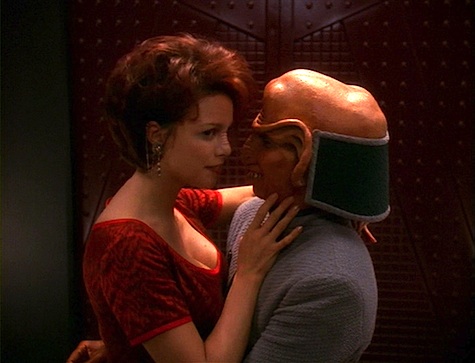
What happens in the holosuite stays in the holosuite: Quark suggests Rom drown his sorrows in a holosuite program called Vulcan Love Slave, Part 2: The Revenge. I don’t even…
Keep your ears open: “You’re not talking about replacing real doctors?”
“No, of course not. Why is everyone so worried about holograms taking over the universe?”
Sisko asking a legitimate question and Zimmerman’s exasperated reply.
Welcome aboard: Robert Picardo wanders across the lot from Voyager to play both Zimmerman and another iteration of the Emergency Medical Hologram that he plays on the sister show.
Brian George and Fadwa El Guindi play Bashir’s parents. George—a great character actor who can currently be seen in a recurring role as Raj’s father on The Big Bang Theory—will appear as O’Zaal in Voyager’s “Drive.”
J. Patrick McCormack shows up long enough as Bennett in the holocommunicator so he can deliver the moral of the story in as awkward a manner as possible; he’ll be back in Voyager’s “Counterpoint” as Prax and in Star Trek Nemesis as a Romulan. Plus we have Max Grodénchik and Chase Masterson as Rom and Leeta.
Trivial matters: Fadwa El Guindi is actually a PhD in anthropology, currently the Distinguished Professor of Anthropology at Qatar University in Doha. For a time, she was the president of the Los Angeles chapter of the American-Arab Anti-Discrimination Committee, and she has been a fierce advocate for Arab-Americans. She co-wrote and co-directed a community play in L.A. called Mahjar, which ran in the summer of 1996. When the lead actress dropped out at the last minute, El Guindi filled in. One audience member was the assistant casting director for DS9, Ron Surma.When the role of Amsha came up, Surma invited her to audition. It remains her only screen acting credit.
This episode establishes that Bashir was genetically enhanced, something the character has taken great pains to keep secret, but which will be public knowledge moving forward.
The unintended consequences of this revelation will be seen in the Starfleet Corps of Engineers series, in which Dr. Elizabeth Lense—established back in “Explorers” as the person who was valedictorian to Bashir’s saluditorian in their Starfleet Medical class—will come under scrutiny by a Starfleet that is fueled by Dominion-induced paranoia, because she beat the genetically engineered guy. In particular the stories “Oaths” by Glenn Hauman, “War Stories” by your humble rewatcher, and “Wounds” by Ilsa J. Bick (in which Bashir appears) address this.
The character of Zimmerman—who was named after production designer Herman Zimmerman—was initially established in the Voyager bible. The original intention was for the EMH to be referred to as “Doc Zimmerman,” and indeed the initial promotions for the show (as well as the first few Voyager tie-in novels) referred to the character thusly before the writers decided to simply refer to him as “the Doctor” (or “the EMH”). This episode is Zimmerman’s first “real” appearance, as he appeared previously in holographic form in the Voyager episodes “Projections” and “The Swarm.” The character will appear again for realsies in Voyager’s “Life Line.”
Your humble rewatcher wrote the Mirror Universe version of Zimmerman in the MU short novel The Mirror-Scaled Serpent in Obsidian Alliances.
Bennett’s reference to Khan’s reign as being two hundred years ago was an error by scripter Ronald D. Moore who remembered Khan’s line from Star Trek II: The Wrath of Khan about ruling two hundred years earlier, but forgot that that movie took place a hundred years prior to this episode.
This is the second—and last—use of the holocommunicator introduced in “For the Uniform,” though a version of it will be used in Star Trek Nemesis.
This episode marks the first mention of Rom’s first wife, also Nog’s mother, Prinadora, as well as the circumstances under which Rom and Nog came to Terok Nor. Prinadora will be mentioned again in “Ferengi Love Songs,” and will at last be introduced in your humble rewatcher’s Satisfaction is Not Guaranteed, the Ferenginar portion of Worlds of DS9 Volume 3.
The original script called for O’Brien to blackmail Zimmerman into keeping Bashir’s genetic enhancements secret in exchange for O’Brien not revealing that Zimmerman has been introducing deliberate errors into the LMH programming in order to sabotage it so it won’t replace the EMH. This would have left Bashir’s enhancements a secret from everyone except Bashir and O’Brien (and the viewers), and Alexander Siddig petitioned to change it so that the genetic engineering was public and could actually affect not only the character but his friends going forward.
Walk with the Prophets: “Please state the nature of the medical emergency.” For the third time, modern-day Trek pulls off a brilliant revelation that snaps a character’s entire being into focus. TNG pulled it off first with “Dark Page” and the discovery that Lwaxana had a previous child who died in an accident, thus explaining her overprotectiveness of her surviving daughter. DS9 then did it earlier this season in the otherwise-execrable “Let He Who is Without Sin…” explaining why Worf’s such a tightly wound, dour bastard with the revelation of his act of unintentional manslaughter as a teenager.
And now we have this. This revelation isn’t entirely out of left field, as some of the things we’ve learned about Bashir have can easily be interpreted in this direction. For starters, there’s the fact that he’s never really had any difficulties doing—well, anything, really, except for his bad-luck-induced crap racquetball playing in “Rivals.” He’s avoided long-term commitments, made it clear he has no interest in a family (he cloaked it in being a career officer when talking about it with O’Brien in “Armageddon Game,” but both men’s commanding officer belies that notion), got a question wrong on his finals that he should never have gotten wrong (“Distant Voices” already hinted that he threw the final on purpose, and now we have a good reason for it), and most tellingly (and this was something Ronald D. Moore cited as a specific inspiration for this script) when Odo asked Bashir if there was anyone he wanted Odo to say hi to on Earth in “Homefront,” Bashir gave a very categorical no.
The revelation aside, this is also a very entertaining episode that starts out very light—which is a nice palliative after three straight really heavy episodes. Robert Picardo is never not wonderful, and he’s at his snotty best here, being unapologetically obnoxious to and exasperated with pretty much everyone. Well, except Leeta, and what’s interesting is that he’s actually somewhat charming with her. Still smarmy, mind you, but Leeta’s reciprocated interest doesn’t feel at all forced, either.
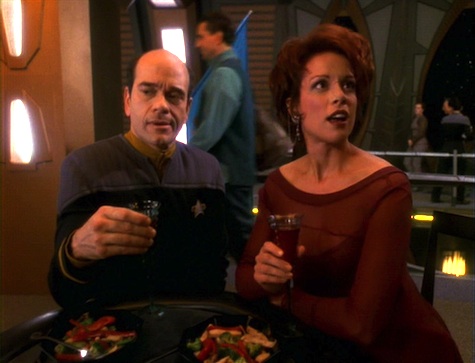
The biggest problem with that half of the plot is that Leeta is sort of standing around waiting for Rom to express interest, as if the only way a relationship can possibly happen is if the male asks the female out, which makes sense if it’s 1958 and you’re still in high school. Instead of standing around expectantly, why doesn’t Leeta just ask Rom out? She tells Quark, “I must be doing something wrong,” and the response to that is, “You’re not actually saying anything to Rom.” Yes, he’s thumphering about trying to work up the courage to express himself, but that’s because he’s Rom and he’s crap at expressing himself. She’s a dabo girl who spends her days expressing herself very very well. So what the hell?
Anyhow, the B-story is harmless enough, more or less. But the meat is the Bashir story, which takes a delightful left turn from the witty banter flying fast and furious—most notably the hilarious scene where they start testing the LMH, giving us Bashir, the LMH, the EMH, and Zimmerman going back and forth, with Alexander Siddig doing a nice impersonation of Picardo’s EMH for a scene—to the more serious revelations about Bashir’s family. Richard is a nice change of pace as it’s nice to know that, even in the utopian Federation, there are still people who are chronic screw-ups. And Fadwa El Guindi is radiant as Bashir’s mother, delivering her speech about the anguish they went through watching six-year-old Jules Bashir fail constantly with passion and intensity that’s made all the more impressive when you realize that she’s an anthropology professor rather than an actor.
Best of all, though, is that this is yet another up-ending of the status quo. Bravo to Siddig for asking that they make the change public, as it opens up a lot more possibilities.
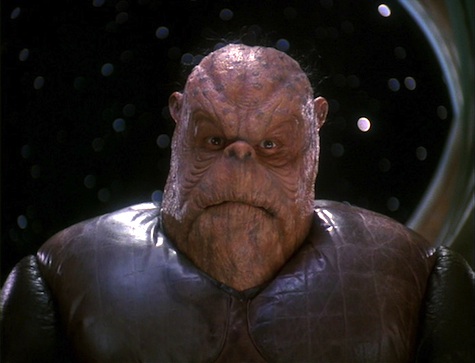
Warp factor rating: 7
Keith R.A. DeCandido will be one of the guests, alongside Nelly Reifler, Tor.com’s own Emmet Asher-Perrin, and host Ryan Britt, for “Lust For Genre: Classic SF&F Readings form Our Favorite Humans,” this coming Friday, the 27th of June, at Singularity & Co. in Brooklyn at 7.30pm. We’ll each be reading, not our own work, but the work of one of our favorite classic authors. Come on by!










